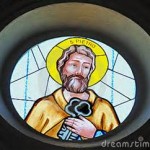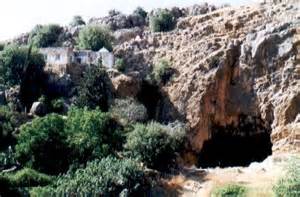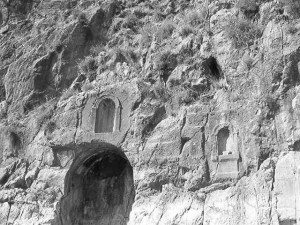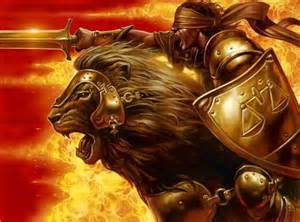What did Jesus mean when He said, “Upon this rock I will build My Church”?
IT’S WORTH CONSIDERING
In Matthew 16 we find Jesus and the disciples at Caesarea Philippi. Jesus had just asked them who they believed Him to be. In response, Peter had responded, “You are the Christ, the Son of the living God.” Jesus’ subsequent words have been interpreted in some very different ways with far-reaching consequences. He acknowledged that Peter’s response came straight from His heavenly Father, and then proclaimed,
“…you are Peter and upon this rock I will build my church; and the gates of Hades shall not overpower it. I will give you the keys of the kingdom of heaven; and whatever you shall bind on earth shall be bound in heaven, and whatever shall be loosed on earth shall be loosed in heaven” (Matt. 16:18-19).
 The Roman Catholic Church interprets this to mean that Peter was the rock upon which the Church was to be built, for he was given the keys that admit or exclude people from heaven as well as the authority to absolve or not absolve people from their sins. With such authority, he became the Bishop of Rome and the head of the Church.
The Roman Catholic Church interprets this to mean that Peter was the rock upon which the Church was to be built, for he was given the keys that admit or exclude people from heaven as well as the authority to absolve or not absolve people from their sins. With such authority, he became the Bishop of Rome and the head of the Church.
A common interpretation by Protestants is that the rock is not Peter, but the truth that Peter professed: Jesus Christ is the Son of the living God. Jesus would build His Church on the fact that He was and is the Son of God. Another Protestant view, especially meaningful to those who have visited Banias in Caesarea Philippi, offers different possibilities. As a likely location for this “discussion,” it provides a vivid backdrop to Jesus message.
This popular tourist spot is the site of a massive rock with carved niches for statues of the Greek God Pan. It was also the site where all sorts of perversion took place while nymphs danced to seductive music. To the left was a large opening from which flowed massive amounts of water from springs below. This was said to be the door to the underworld. In fact, it had come to be called the gates of Hades. This interpretation says that this is the rock Jesus is referring to, the very rock that contained the “gates of Hell.” Jesus would victoriously build His Church right on top of the greatest manifestation of evil they knew of.
where all sorts of perversion took place while nymphs danced to seductive music. To the left was a large opening from which flowed massive amounts of water from springs below. This was said to be the door to the underworld. In fact, it had come to be called the gates of Hades. This interpretation says that this is the rock Jesus is referring to, the very rock that contained the “gates of Hell.” Jesus would victoriously build His Church right on top of the greatest manifestation of evil they knew of.
AS I SEE IT
 As for the Catholic interpretation, the different words used rules out their interpretation. The Greek word for Peter is Petros. The Greek word for rock is Petra, the feminine form for rock (the item), not Rock (the name). This rules out Peter as being the rock upon which the Church would be built.
As for the Catholic interpretation, the different words used rules out their interpretation. The Greek word for Peter is Petros. The Greek word for rock is Petra, the feminine form for rock (the item), not Rock (the name). This rules out Peter as being the rock upon which the Church would be built.
As for Peter’s confession being the rock, it sounds reasonable, but it fails to due justice to the play on words Jesus is using. As for the third explanation, it also sounds reasonable, but only if this is the exact site for this discourse, which we don’t know for certain. It, too, fails to do justice to the play on words. The dramatic effect of Jesus’ words can be seen only if both Petros and petra somehow apply to Peter, but in different ways, not both as his name.
An additional interpretation seems to satisfy the intention of Jesus’ play on words as well as fit with other Scriptures. It suggests that the rock is Peter’s faith. He was the first to discover who Jesus was. Peter is not the rock on which the Church is founded. He is not the Church’s foundation. Jesus is the only foundation (See 1 Cor. 3:11). When the word “rock” is used metaphorically in the Old Testament, it nearly always refers to God (Deut. 32:4, 31; 1 Sam. 2:2; 2 Sam. 22:2; Ps. 18:2, 31).
that the rock is Peter’s faith. He was the first to discover who Jesus was. Peter is not the rock on which the Church is founded. He is not the Church’s foundation. Jesus is the only foundation (See 1 Cor. 3:11). When the word “rock” is used metaphorically in the Old Testament, it nearly always refers to God (Deut. 32:4, 31; 1 Sam. 2:2; 2 Sam. 22:2; Ps. 18:2, 31).
 Peter is, according to this view, the first stone-the first believer in the Church that would see its official beginning at Pentecost. In other words, Peter was the first member of the Church, and so, in a sense, the Church would be built on him. Later, Peter writes that all Christians are living stones who are to be built into the “construction” of the Church (See 1 Peter 2:4-8). Peter was the first on these stones that would make up the Body of Christ.
Peter is, according to this view, the first stone-the first believer in the Church that would see its official beginning at Pentecost. In other words, Peter was the first member of the Church, and so, in a sense, the Church would be built on him. Later, Peter writes that all Christians are living stones who are to be built into the “construction” of the Church (See 1 Peter 2:4-8). Peter was the first on these stones that would make up the Body of Christ.
It makes sense to me that Jesus’ words to Peter meant that the Church would begin with him, not depend on him. God is the rock and Christ is the foundation upon which His Church would be built. No mortal man could possibly assume these roles, no matter what title or office you give him.





Leave A Comment